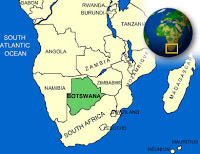Botswana has had one of the world’s fastest growing economies for the last 20 years. The IMF has estimated that Botswana has had an average GDP growth rate of 9% since 1969. With 85% English literacy, membership in multiple trade agreements, and a border with Africa’s most established economy, South Africa, Botswana is well equipped to continue its consistent export-oriented growth into the future. As a potential target for investment, Botswana offers many possible opportunities.
The political climate in Botswana is one of the most stable in the developing world. The government, ranked by Transparency International as one of the least corrupt on Earth, has held free and fair elections since its independence in 1966. Prudent fiscal policy has given Botswana the highest sovereign credit rating in Africa.
The government of Botswana recognizes the importance of foreign capital to its sustained growth. With minimal bureaucratic interference, low corporate taxes, and low taxes on dividends, Botswana ranks as one of the most economically free nations in the world according to the Fraser Institute’s index of economic freedom. The constitution even explicitly prohibits the nationalization of private firms. Recently, the government abolished foreign exchange controls, allowing portfolio investment in the growing Botswana Stock Exchange. Foreign investors are allowed to fully repatriate profit, investment, and capital gains without withholding taxes. Additionally, Russia and Botswana have a double taxation agreement.
Botswana’s current largest industry is mining. It is the world’s foremost producer of diamonds and gem quality stones. The structure of the economy, however, is undergoing a transition toward a more diverse composition. Agriculture and manufacturing are growing in importance. Botswana’s cattle industry is responsible for providing both processed meat to South Africa and leather to European automakers. Membership in various trade agreements allows local textile firms to import materials from anywhere in the world and export duty and quota free to South Africa, Europe, and the United States. The country’s membership in the South African Customs Union gives its businesses free access to the Atlantic Ocean through neighboring Namibia.
Botswana also has a well-developed tourism industry. The growing worldwide interest in “ecotourism” has made Botswana a major destination for African tourism. In addition to the country’s natural beauty, Botswana offers visitors an unparalleled degree of personal freedom and security relative to other sub-Saharan countries. The official language, English, opens the country to visitors from the wealthy English speaking world. Botswana’s tourism industry currently focuses on low volume, high cost tourism, leaving opportunities available for expansion and development.
Criticism has been launched against Botswana regarding its productivity. Total Factor Productivity, an aggregate measure of capital and labor productivity, ranks Botswana below well performing middle-income countries. A report by the World Bank attributed this problem, among other factors, to domestic firms’ access to subsidized, public credit. Taken in the aggregate, the imbalance between subsidized and unsubsidized loans does pose a genuine problem for the economy. Aside from the somewhat unfair comparison to middle income countries the World Bank cited, private foreign investors can sidestep this potential hurdle. Investing in a country does not mean literally placing a bet on its economic indicators. As with any other investment, investors in Botswana must consult with their financial advisor and look at the fundamentals of a particular firm or industry before investing.
Botswana is still a developing economy and faces challenges just like all developing economies. Compared to similar countries in Africa and around the world, Botswana is off to a very strong start on its path toward development. Investors looking to find new opportunities in emerging economies should talk to a financial advisor about investing in one of Africa’s most successful economies.

